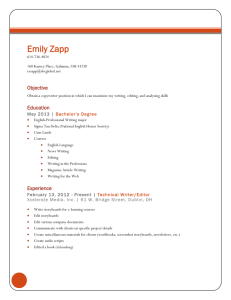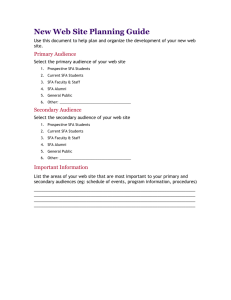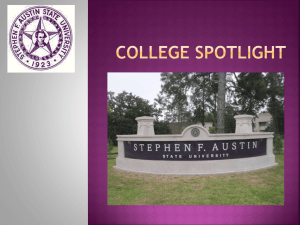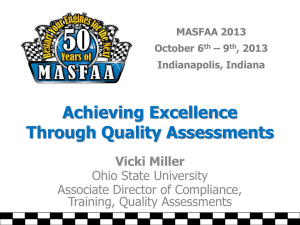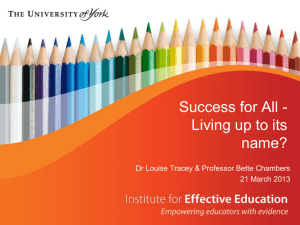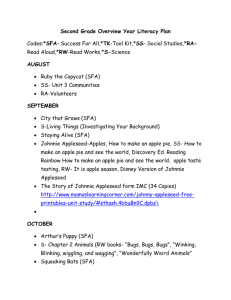S tudent Services Academic Affairs 84
advertisement
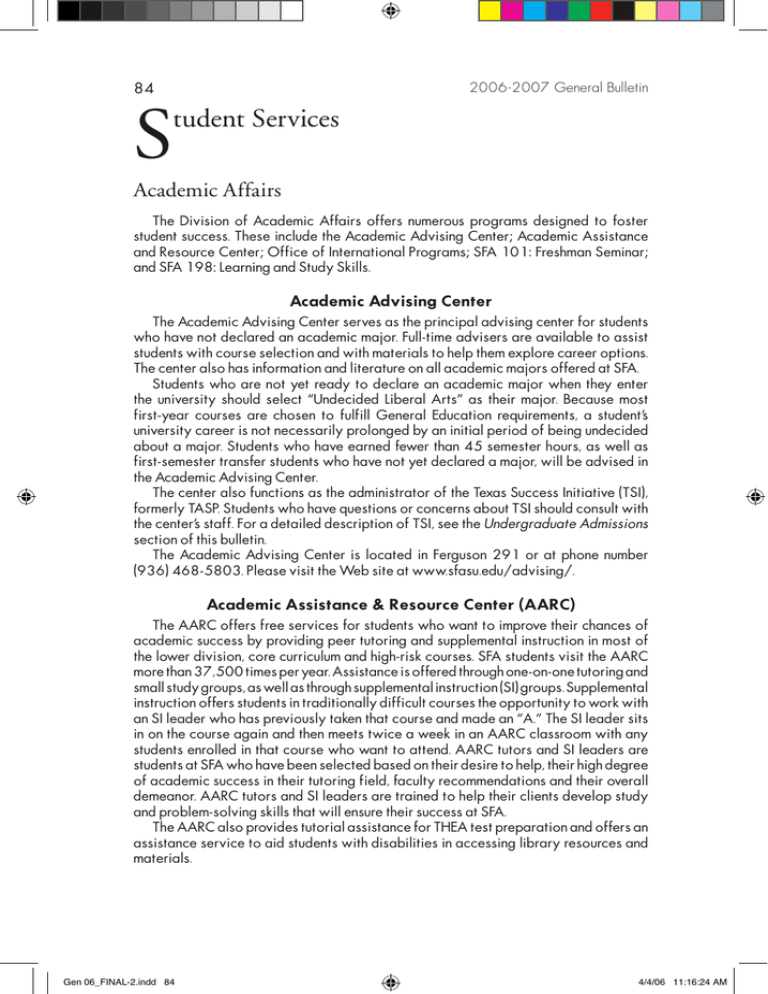
84 2006-2007 General Bulletin S tudent Services Academic Affairs The Division of Academic Affairs offers numerous programs designed to foster student success. These include the Academic Advising Center; Academic Assistance and Resource Center; Office of International Programs; SFA 101: Freshman Seminar; and SFA 198: Learning and Study Skills. Academic Advising Center The Academic Advising Center serves as the principal advising center for students who have not declared an academic major. Full-time advisers are available to assist students with course selection and with materials to help them explore career options. The center also has information and literature on all academic majors offered at SFA. Students who are not yet ready to declare an academic major when they enter the university should select “Undecided Liberal Arts” as their major. Because most first-year courses are chosen to fulfill General Education requirements, a student’s university career is not necessarily prolonged by an initial period of being undecided about a major. Students who have earned fewer than 45 semester hours, as well as first-semester transfer students who have not yet declared a major, will be advised in the Academic Advising Center. The center also functions as the administrator of the Texas Success Initiative (TSI), formerly TASP. Students who have questions or concerns about TSI should consult with the center’s staff. For a detailed description of TSI, see the Undergraduate Admissions section of this bulletin. The Academic Advising Center is located in Ferguson 291 or at phone number (936) 468-5803. Please visit the Web site at www.sfasu.edu/advising/. Academic Assistance & Resource Center (AARC) The AARC offers free services for students who want to improve their chances of academic success by providing peer tutoring and supplemental instruction in most of the lower division, core curriculum and high-risk courses. SFA students visit the AARC more than 37,500 times per year. Assistance is offered through one-on-one tutoring and small study groups, as well as through supplemental instruction (SI) groups. Supplemental instruction offers students in traditionally difficult courses the opportunity to work with an SI leader who has previously taken that course and made an “A.” The SI leader sits in on the course again and then meets twice a week in an AARC classroom with any students enrolled in that course who want to attend. AARC tutors and SI leaders are students at SFA who have been selected based on their desire to help, their high degree of academic success in their tutoring field, faculty recommendations and their overall demeanor. AARC tutors and SI leaders are trained to help their clients develop study and problem-solving skills that will ensure their success at SFA. The AARC also provides tutorial assistance for THEA test preparation and offers an assistance service to aid students with disabilities in accessing library resources and materials. Gen 06_FINAL-2.indd 84 4/4/06 11:16:24 AM 2006-2007 General Bulletin 85 AARC is located on the first floor of the Steen Library. For additional information on how to register for services, stop by the AARC reception desk, call (936) 468-4108, or visit the AARC Web page at http://libweb.sfasu.edu/aarc. Students may register for a tutoring appointment online. International Student Support Services The Office of International Programs and the Multicultural Center provide international student support services. Services include an SFA orientation, cultural adjustment, assistance with visa issues, banking assistance, social opportunities, resources for assistance, and initial transportation from regional airports to Nacogdoches upon arrival in Texas. In addition, the American English Language Institute is a safety net for students who encounter difficulties with the use of the English language. Academic support is offered through the Academic Assistance and Resource Center (AARC). All offices and departments at SFA are committed to student success and therefore will assist international students with their needs. Also available is a 12-month residence hall, open year-round, which allows uninterrupted living for any student who might be unable to return home during holiday or vacation periods or semester breaks. SFA 101: Freshman Seminar It is important that students understand how a university works and what they need to do to be successful. Toward that end, the university has created a one-credit course designed specific ally for the first-semester college student. In classes of no more than 25, SFA 101 students work with an experienced SFA instructor and a successful junior, senor or graduate student. SFA 101 is not a required course, however, there are things in SFA 101 to benefit all beginning college students. SFA 101. This course provides study and practice in methods for success in college. Topics include critical thinking skills, study skills, time and money management, goal setting, career planning, and a review of university resources and regulations. SFA 198: Learning and Study Skills. Applications of theoretical and practical research on learning and successful academic performance; emphasis on practical aspects of learning and study skills. University Affairs The Division of University Affairs is composed of the following departments: Counseling and Career Services, Student Health Services, Auxiliary Services, University Police, Intramural Activities, Judicial Office, Student Affairs, Student Publications, Disability Services and Intercollegiate Athletics. Gen 06_FINAL-2.indd 85 4/4/06 11:16:24 AM 86 2006-2007 General Bulletin Athletics Mission: Stephen F. Austin State University is a comprehensive, state-supported university committed to excellence in undergraduate and graduate education. This commitment extends to maintaining a successful intercollegiate athletic program as a substantial contributor to a comprehensive collegiate environment. The goals of the university and the Intercollegiate Athletics Department include excellence in achievement through specialized and multidisciplinary development, training and competition. The university and the Intercollegiate Athletics Department provide a successful, high quality program that involves a broad range of sports for students throughout the campus community, conforms to NCAA and Southland Conference regulations, and focuses on the educational, physical, mental and social well being of student-athletes. The university and the Intercollegiate Athletics Department ensure that all studentathletes meet academic standards set by the university and NCAA. All student-athletes are encouraged to complete chosen academic programs and become contributing citizens. Their health and safety receive the highest priority. The university and the Intercollegiate Athletics Department are committed to providing equal opportunities for all student-athletes and members of the athletics staff. SFA competes in both men’s and women’s intercollegiate athletics on the NCAA Division I level (I-AA football) as members of the Southland Conference. Men’s intercollegiate sports include football, cross-country, basketball, baseball, indoor/outdoor track and golf. Women’s intercollegiate sports include basketball, equestrian, cross-country, softball, indoor/outdoor track, volleyball, tennis and soccer. Excellent facilities are located on campus, including a 15,000-seat artificial turf football stadium, a 7,000-seat basketball coliseum and an all-weather surface track. Campus Safety & University Police The University Police Department is responsible for the protection of public and private property, public safety and the enforcement of university regulations and of the laws and ordinances of the city of Nacogdoches and the state of Texas. Known or suspected wrongful acts, loss of personal property, safety hazards, accidents or other emergencies should be reported to the university police immediately. Police headquarters are open 24 hours a day. The department provides 24-hour patrol protection to the campus, including all parking lots, residence halls and married student housing. Each semester, the department provides classes for residence hall supervisors, resident hall assistants and other campus leaders. It also presents programs relating to campus safety, theft prevention and sexual assault prevention. Located at various campus locations are emergency call boxes. These call boxes are bright yellow in color and are labeled “Police” in black letters. Operation of a call box is easy. A person opens the door, pushes the appropriate button and talks directly into the speaker when the call is answered. The call goes directly to the University Police Department Communications Division. Call boxes can be used to request police assistance, escorts, assists with vehicle problems and information. The university also continues to replace and enhance campus lighting to ensure pathways are adequately illuminated. Gen 06_FINAL-2.indd 86 4/4/06 11:16:25 AM 87 2006-2007 General Bulletin Counseling & Career Services The Counseling and Career Services staff assists students to develop a positive self-image, discover career goals, develop a sense of self-direction and prepare for careers in their chosen fields. Orientation. Orientation is provided for transfer students, new freshmen and their parents in the summer prior to enrollment. An orientation session for those not attending Summer Orientation is held each semester prior to registration. Counseling Services. Confidential assistance by Licensed Professional Counselors help students deal with personal adjustment and relationship problems as well as educational problems such as time management, study habits and test anxiety. Career counseling includes career interest surveys, a career library and SIGI 3 (the System of Interactive Guidance Information). Alcohol Services. Confidential substance abuse counseling and referrals are available, and staff members will provide educational programs for student groups. The Mental Health Library contains books, periodicals and free pamphlets about alcohol/drug use and abuse. Testing Services. National tests such as the ACT, GRE, MAT, LSAT, MCAT, TEXES/ ExCET, and GMAT, and the state-mandated THEA and Quick THEA are offered through this office. Computer-based testing is offered for the THEA, ACCUPLACER (approved THEA substitute), GRE, GMAT, TOEFL, NET, MAP, and CLEP. Distance learning testing and the GED, for those establishing high school equivalency, and correspondence tests are also administered. Career Services. This office is a liaison between employers and prospective employees. Professional credentials are maintained electronically and disseminated for graduating students and alumni. Job vacancies and internships are posted online and a career library has useful information relative to job search preparation and prospective employers. Students are encouraged to register with Career Services early in their college career. Student Employment Center. This office assists students who are seeking parttime employment on or off campus. The SEC verifies students’ eligibility for campus employment, maintains student files for prospective employers and maintains vacancy listings, which are posted in the office and online. Disability Services The university is committed to providing equal opportunities in higher education to academically qualified students with disabilities who demonstrate a reasonable expectation of college success. Students with disabilities who attend SFA will be integrated as completely as possible into the university community. The university shares responsibility with the student for modifying campus facilities and programs to meet the individual need. Following acceptance for clear admission to SFA, the process of obtaining services and accommodations begins with the submission of documentation by the student and completion of the application for services. Special housing accommodations needed because of a disability should be requested on the request form available through the Housing Office or Disability Services. Documentation for academic and/or housing accommodations should provide sufficient evidence of a disability which substantially limits one or more major life activities as defined by Section 504 of the Rehabilitation Act of 1973 as amended, and the Americans with Disabilities Act of 1990. Guidelines for documentation are provided by Disability Services and should be reviewed by the Gen 06_FINAL-2.indd 87 4/4/06 11:16:25 AM 88 2006-2007 General Bulletin student prior to obtaining documentation from a qualified professional. Guidelines for learning disabilities are intended to meet or exceed those adopted by the Association of Higher Education and Disabilities (AHEAD). Documentation should be submitted well in advance of the initial semester in which accommodations will be requested. Sufficient time is necessary to provide for committee review of documentation and appropriate coordination of services. Recommended accommodations may differ from those provided in the public school setting. The committee review is aimed toward identifying areas of substantial limitation based upon the student’s diagnosis; and, recommending the most appropriate accommodations that reasonably can be expected to assist the student in the postsecondary environment. The review committee for academic accommodations meets monthly. The complete application and documentation should be received in Disability Services by the fifth of the month in which the student seeks review. Committee review of housing requests is scheduled as needed. Refer to Americans with Disabilities Act of 1990 & Section 504 in the University Policies section of this bulletin regarding provision of services for persons with disabilities. Requests for additional information should be directed to: Disability Services, Stephen F. Austin State University, P.O. Box 6130, Nacogdoches, Texas 75962-6130; voice: (936) 468-3004, TDD: (936) 468-1004; fax: (936) 4681368; www.sfasu.edu/disabilityservices/index.htm. Housing The housing and residence life program exists as an integral part of the educational program and academic support services of the university. The mission of housing and residence life is to provide a residential environment that is clean, well-maintained and comfortable while cultivating a community that stimulates student development through co-curricular programs grounded in both human resource and student development theories. Students who have less than 60 hours of completed course work or who are younger than 21 years of age reside on-campus and have the opportunity to discover the full university experience. Additional housing information, off-campus requirements policies and procedures can be found at www.sfasu.edu/housing. Judicial Office The Judicial Office adjudicates student misconduct in a manner that complements the university’s mission to enhance total education. It is the goal of the Judicial Office that every disciplinary hearing serve as a teachable moment that assists a student in learning to live in a community as a responsible citizen. The Judicial Office also provides student advocacy, alcohol and other drug education, and houses the student legal counsel. The student legal counsel is an attorney provided by the university to offer free legal counseling to students. Student Affairs The mission of Student Affairs is to promote student learnnig and personal development. We work to promote an environment of active learning that is directed toward our students’ social, civic, leadership, ethical and career development that is supportive of their academic achievement and consistent with the goals of the university. The programs, services and facilities we offer contribute to our mission and Gen 06_FINAL-2.indd 88 4/4/06 11:16:25 AM 2006-2007 General Bulletin 89 encourage the development of community and productive, healthy lifestyles. During the construction of the new Student Center, all Student Affairs departments are temporarily located in the Birdwell Building. Student Affairs is comprised of the following departments: Student Activities, Campus Recreation, Multicultural Center, Student Leadership Center, Jack Camp and the SFA Spirit Program. The SFA Ticket Office and SFA Graphics Shop help round out the services Student Affairs offers by providing ticket sales and printing services for the entire university community. Some of the departments within Student Affairs gather the names, addresses, e-mail addresses and telephone numbers of persons registering with the university as student organization officers and advisers. This information will be considered directory information. The Student Affairs Web site is: www.osa.sfasu.edu. Student Activities The mission of Student Activities is to advance the mission of both the university and Student Affairs by encouraging student involvement in the university community. These opportunities for involvement are purposefully designed to improve the quality of community life and to promote the development of responsible citizens and leaders. Student Activities is comprised of several areas including the Student Activities Association and Student Organization Services. Student Activities also provides assistance to students registering items to post on campus and making grounds reservations. Student Activities Association (SAA) The Student Activities Association is one of the most active student programming bodies on campus. SAA produces more than 100 events each year ranging from concerts and comedians to game shows and lectures. SAA is a great place for students to develop relationships, sharpen their leadership skills and help make SFA the kind of place they want to call home. Student Organization Services (SOS) Student involvement is critical to student satisfaction and consequntly student retention. Student organizations at SFA provide thousands of students with a positive involvement experience. Student Activities is the support center for more than 220 active stuent organizations at SFA. Campus Recreation Campus recreation promotes a wellness-focused environment at SFA that encourages healthy lifestyle choices and social interaction while enhancing student life by providing educational experiences, activities for student participation, student development- oriented opportunities and excellent support services. Opportunities for active competition, fitness conditioning, skill building, stress release, leadership development, and peer socialization will be available through campus recreation programming. Students will be able to take advantage of these opportunities through programs such as aquatics, intramurals, sport clubs, fitness, wellness, and outdoor programs. Campus recreation also coordinates all campus-wide alcohol awareness education through its wellness program. The new Student Recreation Center will be the home of campus recreation when it opens in the fall of 2007. Gen 06_FINAL-2.indd 89 4/4/06 11:16:25 AM 90 2006-2007 General Bulletin Multicultural Center The Multicultural Center’s mission is to support SFA in preparing graduates for success in a diverse and global community. The center accomplishes this by providing many opportunities for our minority and international students to become active, productive and collaborative within the university community. In addition, the center strives to promote cultural awareness and respect for cultural diversity to the entire university community. Student Leadership Center The Student Leadership Center consists of the following programs: Freshman Leadership 101, the SFA Leadership Academy for emerging leaders and Omnicron Delta Kappa for established leaders. The students awards program also is coordinated by the SLC. Jack Camp - New Student Transition Program Jack Camp is an optional program for incoming frreshmen and transfers designed to help new students establish friendships, meet student leaders, become familiar with SFA traditions and learn about SFA campus life in a very relaxed atmosphere. Students who participate in this program have a significantly higher retention rate compared to those students who do not. SFA Spirit Programs Dedicated to excellence, the SFA spirit teams haave captured numerous national championships and remain a model program for spirit and dance teams all over the country. Membership is highly competitive. Cheerleaders Part of the SFA landscape for more than 70 years, these students serve as the ambassadors for spirit and Lumberjack pride at football and basketball games nationwide. Composed of 24-26 students plus the Lumberjack mascot, these students have won National Cheerleading Association National Championships in 1994, 1997, 2000, 2001, 2003, 2004 and 2005. Pom Squad The SFA Pom Squad is made up of some of the best college dancers in the nation. This five-time national champion squad performs at all home SFA football and men’s and women’s basketball games. The SFA All-Girl Squad The All-Girl Squad cheers at SFA football and volleyball games and attends NCA Nationals where they have been a top five finisher. Graphics Shop This is the university’s one-stop-shop for copies, digital printing, large format posters, banners and other print-related services and supplies. The Graphics Shop specializes in fast turn-around of small quantity jobs helping students and campus departments produce needed materials quickly. SFA Ticket Office The SFA Ticket Office sells tickets for SFA athletic events, campus departmental events and community activities. The ticket office also offers regional amusement park tickets to students and employees at a discount (compared to gate prices). Gen 06_FINAL-2.indd 90 4/4/06 11:16:25 AM 2006-2007 General Bulletin 91 Student Government The Student Government Association (SGA) serves as the representative voice of the student body to the faculty and administration. Concerns and issues important to students can be made known through legislation passed by the SGA. A three-branch system consisting of the executive, legislative and judicial branches is utilized. The president of SGA with the help of the other executive officers heads the executive branch and helps activate legislation passed by the Student Senate. The senate is chaired by the speaker and is comprised of representatives elected from the colleges and classes. Judicial authority is vested in the Student Surpeme Court. Student Health Services University Health Services provides primary health care to the university students. Currently enrolled students are eligible for most clinic services without additional costs, including consultation, diagnosis and treatment provided by the clinic staff. In addition, some optional services are provided at low cost. There are no facilities on campus for X-ray, overnight stay, dental, optometrical or pharmacy services. These services may be obtained locally. The clinic is staffed by primary care specialists in pediatrics or family medicine, nurses, certified laboratory personnel, administrative and clerical personnel. The clinic hours are 8 a.m. to 5 p.m., Monday through Friday. Patients are seen utilizing an appointment system. Appointments can be made by calling 468-4008. Urgent medical problems are seen when they present themselves to the clinic. Walk-in patients will be screened by the nurses utilizing an approved protocol. Patients who are screened will be worked into the physicians’ schedules, given an appointment time or treated for minor problems utilizing the approved protocols. Medicines (prescriptions), X-rays and further consultations with medical personnel ordered or requested by clinic physicians must be procured in the community at the student’s expense. Students are responsible for any services obtained outside the clinic, including hospital, ambulance or physician fees. After-hours emergencies are handled through local hospital emergency rooms. Since both the hospital and the doctor charge for these services, every student should be covered by a medical/hospitalization insurance policy. Those students who do not have hospitalization insurance are strongly urged to obtain the university-endorsed student health policy or its equivalent to cover after-hours emergencies, hospitalizations or injuries requiring referral to a specialist. For additional information consult the clinic brochure or call (936) 468-4008. Immunizations All students must show adequate levels of: 1. Immunity, acquired naturally or by immunization, against the following diseases: Tetanus/Diphtheria - The last of the three initial injections or a booster must have been within the past 10 years; Poliomyelitis-(Types I, II, and III); Measles - Prior to registration all new students born on or after January 1, 1957, must show proof of two doses of measles vaccine administered on or after their first birthday and at least 30 days apart or serologic confirmation of immunity to measles; Rubella - Prior to admission all new students must show proof of rubella vaccine administered on or after their first birthday or serologic confirmation of rubella immunity; Mumps - Prior to admission all new students born on or after January 1, 1957, must show proof of mumps vaccine on or after their first birthday or serologic confirmation of mumps immunity. Gen 06_FINAL-2.indd 91 4/4/06 11:16:25 AM 92 2006-2007 General Bulletin 2. Freedom from infectious tuberculosis as evidenced by a negative tuberculin test (PPD) within one year prior to matriculation or a physician’s statement documenting a negative chest X-ray. Evidence of these, such as a statement from a physician or copies of high school or college immunization records, must be provided to the University Health Center. Attention Deficit Disorder Therapy Due to the increasing abuse of Adderall, Ritalin and amphetamines, students desiring prescriptions for these type agents must document need for these drugs through a clear clinical diagnosis of attention deficit disorder or related disorder made by a practicing psychiatrist, psychologist or pediatrician specializing in development disorders. The diagnosis must have been made within three years of the date that the student presents to the SFA Health Clinic requesting the medication, and the assessment methods for making the diagnosis must be identified and the impact of medical therapy on the student’s academic performance documented. Meningitis Vaccination The state of Texas has recommended meningococcal vaccination for all freshmen students coming into a university setting. All students and their families are informed of this by mail prior to their arrival. The university makes this vaccination available in October to all students who would like to be vaccinated after they arrive on campus. Student Publications The Pine Log is the official newspaper of the students of Stephen F. Austin State University and is edited and published under the supervision of the director of student publications. The Stone Fort is a pictorial account of the year and is issued in yearbook form. Pictures for the yearbook are taken by SFA student photographers during fall and spring semesters. University Center The University Center is the hub of campus activities with an emphasis on customer service and satisfaction. Located at the entrance of the university for easy access. Within the University Center are ballrooms, banquet rooms, meeting rooms, conference rooms, lounges, Information Desk, University Center lost and found, Barnes and Noble University Center Bookstore, Inc., University Post Office, Hungry Jack, Grand Central Station, and other eating establishments. Gen 06_FINAL-2.indd 92 4/4/06 11:16:25 AM
